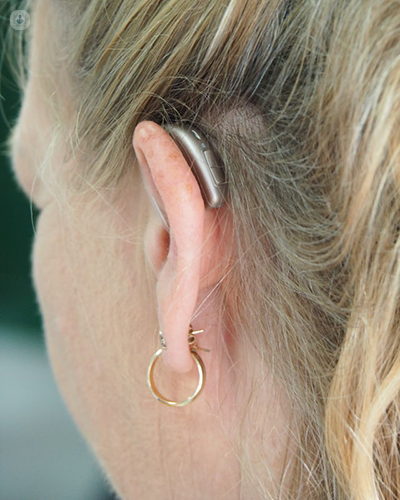Worried about hearing loss? Your questions answered by a specialist
Written in association with:A loss in hearing, whether gradual or sudden, can seriously impact a patient’s quality of life. Fortunately, modern advances in hearing aid technology mean the outlook for those with hearing problems is very positive. In this article, highly-respected consultant ENT surgeon Mr Guna Reddy-Kolanu expertly outlines the most common causes of hearing loss and when it's important to see a specialist. He also details the treatment options that can offer patients improved hearing abilities.

What are the most common causes of hearing loss?
When thinking about causes of hearing loss, it is helpful to consider two categories. The first is when the sound does not get into the inner ear, known as a conductive hearing loss. The second is when the sound gets to the inner ear but it's less sensitive to registering this sound. We call this a sensory hearing loss.
We can give ourselves a conductive loss by putting our fingers in our ears to block the sound from travelling down them. The most common medical condition causing a conductive hearing loss commonly occurs in childhood and is often called glue ear. In this condition, clear, sticky mucus fills the space deep down to the eardrum which normally has air in it. This mucus blocks sound getting in to the inner ear and as a consequence the patient loses the ability to hear.
Most of us will acquire a degree of sensory hearing loss as we get older. With ageing, there is no problem with the sound getting into the inner ears, but the inner ear organ, called the cochlea, becomes less sensitive to the sound coming in.
When should you see a specialist about your hearing?
Broadly, there are three reasons to see a specialist about your hearing. The first is if there is a rapid loss in hearing. If this is the case, then early assessment is important.
The second reason is when the hearing loss is much worse in one ear. This may need further investigation including having a scan of your head.
The third reason is if your hearing loss is impeding your quality of life. This is particularly important in children, as hearing loss can detrimentally affect speech, social development and education.
Is hearing loss always treatable?
There is always something that can be offered to patients with hearing loss. This can range from advice on manoeuvres to clear middle ear pressure to medication to relieve sudden inflammation on the inner ear. We may also advise operations to fix problems impeding sound getting into the inner ear or hearing aids when the inner ear is weakened.
We have, only in the past thirty years or so, come to a point in human civilisation where it is possible for everyone to have a treatment to re-habilitate their hearing.
Is hearing loss ever reversible?
In many situations specialists will avoid intervening too aggressively and too quickly when patients have a loss in hearing. It's, however, important to have the hearing assessed at an early stage as in some circumstances, early medical treatment is recommended.
In a significant number of patients, the problem will reverse itself. When there is a mechanical cause of the hearing being impaired, such as on obstruction or damage to the ear drum, then surgery can be considered to restore hearing to near normal levels. This will need to be assessed by an ENT specialist who can advise on the pros and cons of surgery in this situation.
How has treatment for hearing loss developed in recent years?
Modern treatment of hearing loss is a combination of established tried and tested options and recent advances. Surgery for mechanical obstructions is largely managed by established operations which either remove a blockage, repair the eardrum or connect the eardrum more effectively to the inner ear.
The advances in treatments of hearing loss have been driven by the development of hearing aids. These include implantable aids, including cochlear implants, bone-anchored hearing aids and middle ear implants, as well as conventional aids. All types of aids are increasingly connected to other devices. The opportunities that this will open up in the coming years will be vast. In the longer term there are hopes that stem cell technology may one day allow rejuvenation of natural hearing function.
If you are concerned about hearing loss, you can book a consultation with Mr Reddy-Kolanu by visiting his Top Doctors profile.


